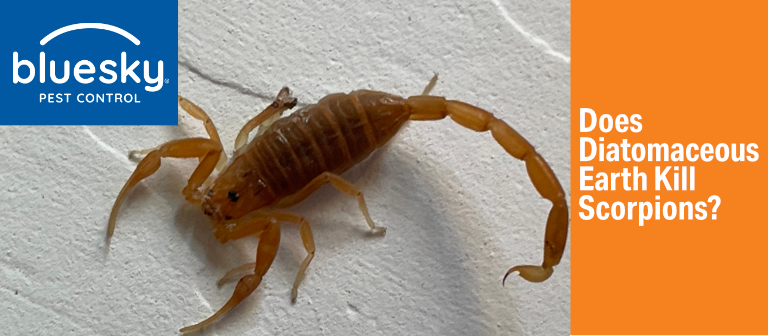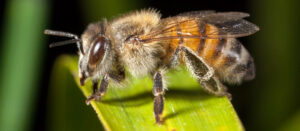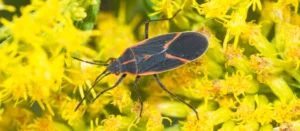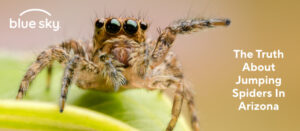$50 OFF New Residential Customers. Learn more
Does Diatomaceous Earth Kill Scorpions?

Fear is a reasonable response to some of the pests we deal with in Phoenix. With their painful stings and aggressive looks, scorpions are at the top of the list of fear-inducing pests. In an attempt to dissuade fear and take proactive action, homeowners often ask, “Does Diatomaceous Earth kill scorpions?”
Diatomaceous Earth, also referred to as DE, is a powdery organic substance that, when used correctly, can help in controlling scorpions and other pests native to Arizona. Let’s take a deep dive into the benefits, limitations, and safety concerns of using Diatomaceous Earth as part of your quest for a pest-free property.
If you live in the Phoenix area and need scorpion control, we’ll give you a free quote. We serve the entire area including Mesa and Scottsdale. We also offer other pest control services such as rodent control and termite prevention.
Does Diatomaceous Earth Work?
DE is composed of the fossilized remains of single-celled aquatic microorganisms called diatoms. The diatom’s shell is made of one of the hardest substances on the planet, silica. Even though the powder is smooth and silky to us, when it comes in contact with small animals like insects, the sharp edges of the silica create hundreds of abrasions on them. These shards cause the insect to become dehydrated and ultimately dry out and die.
In principle, Diatomaceous Earth can be effective in helping with scorpion control. Furthermore, DE can be fundamentally effective in controlling other pests such as ants, mites, beetles, grubs, fleas, earwigs, millipedes, silverfish, bed bugs, crickets, centipedes, cockroaches, and more pests. When applied correctly, DE shouldn’t be harmful to bees.
Where to Put Diatomaceous Earth
As noted above, DE can be an effective pest control option, but only when used properly. And as you may have guessed, proper use does require some skill and forethought. It is NOT about slopping DE everywhere and hoping to gain control over the pests making your property their home. Here are some considerations and steps we recommend for the best results when it comes to controlling scorpions and other pests with Diatomaceous Earth:
Considerations
- Diatomaceous Earth works best where it will stay dry, won’t blow away in the wind, or get disturbed by opening windows/doors or other activities. Though these conditions can limit DE use, it will help generate the safest and most progressive results. With the above in mind, DE will work best in secluded, sheltered areas and indoors where it won’t get disturbed, such as in void areas in walls and crack/crevice treatments around cabinets and baseboards.
- Scorpions can be very sensitive to the surface they walk on and what else may be on it. When a scorpion detects a substance like a chemical or other treatment like DE, they will perform a behavior called “stilting”, where they stiffen their legs and walk on their “tip toes” to avoid the questionable material they are in contact with. In fact, they lift up their entire bodies off the ground to avoid it. To use DE effectively, it needs to be placed in hidden, tight areas (like cracks, crevices, and void areas) where the scorpion will be forced to squeeze into and expose itself to the treatment. Otherwise, they are likely to be unaffected.
- Any over-applied powder or powder placed in the wrong locations can be messy and unsightly. This is another reason why treatments should be limited to areas not visible to people or available to children or pets. Also, if the powder is disturbed, it increases the likelihood of breathing it in, which can be harmful (see ‘Is It Safe’ section below).
Recommended Treatment Steps
- Find the locations around your home and yard where you have seen scorpions. This typically will be near cracks in doors and windows, around holes in your baseboards, or along the block walls on the ground. These will be the ideal areas to treat.
- Apply DE to the areas mentioned above. The goal is to have the scorpions come in contact with the DE as much as possible. To do this, be certain to apply the powder evenly inside the cracks/crevices and void areas in a thin layer. This is best done using a duster specifically designed for the job. Outside, apply under objects like statues, door mats, step stones, etc. Inside, your attic and basement are excellent places to treat as well.
- Reapply the DE powder after rains, after strong winds, or as otherwise needed. If you limit treatments to those recommended here, you will get the most effective results with DE possible while minimizing reapplications.
How Long Does It Take DE To Work?
Though instant results are always desirable, Diatomaceous Earth, unfortunately, doesn’t kill immediately and it can take some time for the pests to desiccate. Results can also be affected by the weather, among other things. The good news is that if left undisturbed, you can start seeing results in as little as 2 days, and more accurate/prominent results after 5-6 days.
Is It Safe to Use Diatomaceous Earth?
Safety should always be your number one concern when it comes to applying any new substance around your home or yard. DE is a proven safe and non-toxic resource for humans, wildlife, and mammals. In fact, DE is commonly used in the food industry and given to dogs and cats as a natural de-wormer.
The caution contingency? Inhalation. DE inhalation exposure can pose a risk as it isn’t healthy for humans or animals to breathe in the fine powder. Inhalation can be especially concerning if long-term exposure has taken place. To reduce risk, be cautious when applying to not create airborne clouds that can facilitate breathing in the substance. For more precaution, we recommend using a mask during application, as that is an easy and simple way to avoid any respiratory issues. In addition to preventing inhalation, it’s also important to avoid getting DE into the eyes as it can cause severe irritation.
Where to Buy It In Phoenix
There are numerous retailers in the Phoenix area that carry Diatomaceous Earth. It shouldn’t be difficult to purchase DE powder for your individual needs. Be sure to purchase food grade DE as opposed to pool grade DE. Food grade Diatomaceous Earth is more effective than pool grade when using for pest control purposes.
Conclusion – Does Diatomaceous Earth Kill Scorpions?
In summary, yes. Diatomaceous Earth can be a useful addition to a DIY pest control program when the steps and considerations outlined here are followed. However, keep in mind that DE is limited in how and where it can be used effectively and is not intended to act as a standalone solution to your pest control needs. We here at Blue Sky Pest Control do not use DE in our programs as there are more effective, professional products available within both natural and traditional control programs.
Still need help?
If you continue to struggle with unwanted scorpions or other Arizona pests, Blue Sky Pest Control can help. Our highly trained technicians have extensive experience handling all pest problems, including expertise in scorpion control. One thing is for sure, you and your family deserve to live pest-free. If the DE isn’t getting the job done, have peace of mind knowing we are ready and willing to help. We serve all of Phoenix including surrounding areas such as Gilbert, Surprise, Glendale, and Chandler!
Related Posts

Killer Bees in Arizona? Understanding Africanized Bees and How to Coexist Safely
You’ve likely heard the term “killer bees” used to describe Africanized bees in Arizona, but did you know this nickname…

Red & Black Intruders: Meet Arizona’s Boxelder Bugs
Boxelder Bugs in Arizona If you’ve ever stepped outside and spotted a cluster of black-and-red bugs crawling on your porch…

Jumping Spiders in Arizona: Harmless or Hazardous?
Jumping spiders in Arizona might be small, but they can certainly give you a big surprise when they suddenly appear…